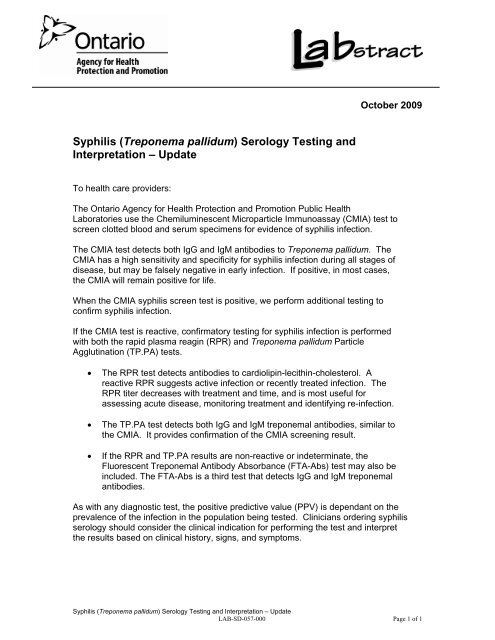Syphilis (Treponema pallidum) Serology Testing and Interpretation ...
Syphilis (Treponema pallidum) Serology Testing and Interpretation ...
Syphilis (Treponema pallidum) Serology Testing and Interpretation ...
You also want an ePaper? Increase the reach of your titles
YUMPU automatically turns print PDFs into web optimized ePapers that Google loves.
<strong>Syphilis</strong> (<strong>Treponema</strong> <strong>pallidum</strong>) <strong>Serology</strong> <strong>Testing</strong> <strong>and</strong><br />
<strong>Interpretation</strong> – Update<br />
To health care providers:<br />
October 2009<br />
The Ontario Agency for Health Protection <strong>and</strong> Promotion Public Health<br />
Laboratories use the Chemiluminescent Microparticle Immunoassay (CMIA) test to<br />
screen clotted blood <strong>and</strong> serum specimens for evidence of syphilis infection.<br />
The CMIA test detects both IgG <strong>and</strong> IgM antibodies to <strong>Treponema</strong> <strong>pallidum</strong>. The<br />
CMIA has a high sensitivity <strong>and</strong> specificity for syphilis infection during all stages of<br />
disease, but may be falsely negative in early infection. If positive, in most cases,<br />
the CMIA will remain positive for life.<br />
When the CMIA syphilis screen test is positive, we perform additional testing to<br />
confirm syphilis infection.<br />
If the CMIA test is reactive, confirmatory testing for syphilis infection is performed<br />
with both the rapid plasma reagin (RPR) <strong>and</strong> <strong>Treponema</strong> <strong>pallidum</strong> Particle<br />
Agglutination (TP.PA) tests.<br />
• The RPR test detects antibodies to cardiolipin-lecithin-cholesterol. A<br />
reactive RPR suggests active infection or recently treated infection. The<br />
RPR titer decreases with treatment <strong>and</strong> time, <strong>and</strong> is most useful for<br />
assessing acute disease, monitoring treatment <strong>and</strong> identifying re-infection.<br />
• The TP.PA test detects both IgG <strong>and</strong> IgM treponemal antibodies, similar to<br />
the CMIA. It provides confirmation of the CMIA screening result.<br />
• If the RPR <strong>and</strong> TP.PA results are non-reactive or indeterminate, the<br />
Fluorescent <strong>Treponema</strong>l Antibody Absorbance (FTA-Abs) test may also be<br />
included. The FTA-Abs is a third test that detects IgG <strong>and</strong> IgM treponemal<br />
antibodies.<br />
As with any diagnostic test, the positive predictive value (PPV) is dependant on the<br />
prevalence of the infection in the population being tested. Clinicians ordering syphilis<br />
serology should consider the clinical indication for performing the test <strong>and</strong> interpret<br />
the results based on clinical history, signs, <strong>and</strong> symptoms.<br />
<strong>Syphilis</strong> (<strong>Treponema</strong> <strong>pallidum</strong>) <strong>Serology</strong> <strong>Testing</strong> <strong>and</strong> <strong>Interpretation</strong> – Update<br />
LAB-SD-057-000 Page 1 of 1
Screening<br />
Test<br />
<strong>Syphilis</strong> (<strong>Treponema</strong> <strong>pallidum</strong>) <strong>Serology</strong> <strong>Testing</strong> <strong>and</strong> <strong>Interpretation</strong> –<br />
Update (Continued)<br />
Table 1. <strong>Interpretation</strong> of <strong>Syphilis</strong> Serological Results<br />
Confirmation <strong>Testing</strong><br />
CMIA RPR TP.PA FTA-Abs INTERPRETATIONS<br />
Non-reactive Not tested Not tested Not tested No serological evidence of current or past<br />
infection<br />
If primary syphilis is suspected a repeat sample<br />
Reactive<br />
Reactive<br />
Reactive<br />
(high titre, RPR>16)<br />
Reactive<br />
(low titre, RPR < 8)<br />
Reactive<br />
Reactive<br />
Reactive Non- reactive Reactive<br />
Reactive Non-reactive Non- Reactive Non- reactive<br />
Reactive Non- reactive Non- Reactive Indeterminate<br />
Reactive Non- reactive Indeterminate Non- reactive<br />
Reactive<br />
Age < 12<br />
MONTHS<br />
Reactive<br />
Age < 12<br />
MONTHS<br />
Reactive<br />
Non - reactive Indeterminate Indeterminate<br />
Reactive<br />
Reactive<br />
Non- reactive Reactive<br />
is suggested in ~ 4 weeks<br />
Not tested Most likely interpretations include:<br />
• Active infectious syphilis (primary, secondary<br />
or early latent)<br />
• Latent or treated syphilis<br />
Not tested Most likely interpretations include:<br />
• Active infectious syphilis (primary, secondary<br />
or early latent)<br />
• Latent or treated syphilis<br />
Not tested Most likely interpretations include:<br />
• Treated syphilis<br />
• Early primary syphilis<br />
• Latent syphilis<br />
Most likely interpretations include:<br />
• Early syphilis<br />
• Previously treated syphilis<br />
• Biological false positive<br />
Suggest:<br />
Repeat serology in 2 to 4 weeks. If no change<br />
with repeat serology, likely biological false<br />
positive<br />
Not tested Most likely interpretations include:<br />
• Congenital infection<br />
• Maternal antibody (as can be present in infant<br />
for up to 12 months)<br />
• Repeat serology in 4 weeks<br />
Not tested Most likely interpretations include:<br />
• Maternal antibody (as can be present in<br />
infant for up to 12 months)<br />
• Does not rule out congenital infection<br />
• Repeat serology in 4 weeks<br />
• In rare cases, syphilis serology may be falsely positive with non-syphilis treponemal infections (e.g.<br />
yaws, pinta, or bejel), other infections (including HIV), rheumatological illness, intravenous drug use,<br />
pregnancy, <strong>and</strong> recent immunization.<br />
• <strong>Interpretation</strong> of results must be based on clinical history, signs, <strong>and</strong> symptoms.<br />
This document does not apply to testing for syphilis in primary lesions <strong>and</strong> cerebrospinal<br />
fluid (CSF).<br />
For further information, please contact:<br />
• Dr. Vanessa Allen, medical microbiologist at 416-235-5806<br />
• OAHPP syphilis confirmatory laboratory at 416-235-5713 or your local OAHPP laboratory<br />
• OAHPP laboratory Helpline 1-800-640-7221<br />
• Public Health Agency of Canada web site: www.phac-aspc.gc.ca<br />
• For the Specimen Collection Guide refer to www.oahpp.ca<br />
<strong>Syphilis</strong> (<strong>Treponema</strong> <strong>pallidum</strong>) <strong>Serology</strong> <strong>Testing</strong> <strong>and</strong> <strong>Interpretation</strong> – Update<br />
LAB-SD-057-000 Page 2 of 2






